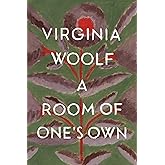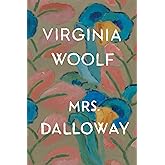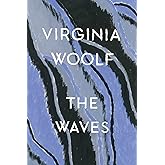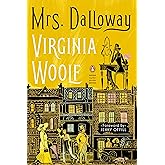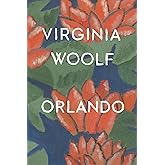
Download the free Kindle app and start reading Kindle books instantly on your smartphone, tablet, or computer - no Kindle device required.
Read instantly on your browser with Kindle for Web.
Using your mobile phone camera - scan the code below and download the Kindle app.



 Audible sample
Audible sample To the Lighthouse (The Classic Collection) Audio CD – Unabridged, July 22, 2014
To the Lighthouse is Virginia Woolf’s arresting analysis of domestic family life, centering on the Ramsays and their visits to the Isle of Skye in Scotland in the early 1900s. Nicole Kidman (Moulin Rouge, Eyes Wide Shut), who won an Oscar for her portrayal of Woolf in the film adaptation of Michael Cunningham’s Pulitzer Prize-winning novel The Hours, brings the impressionistic prose of this classic to vibrant life.
Split into three parts, the story observes Mrs. Ramsay, Mr. Ramsay, and their children at their vacation house on the Isle of Skye. While the novel follows seemingly trivial events between the family members, the plot takes a backseat to philosophical introspection, which gave the novel its fame as an icon of modernist literature. The Ramsays' quest to recapture meaning creates a powerful allegory of man’s impermanent battle with the tangible world.
To the Lighthouse is part of Audible’s A-List Collection, featuring the world’s most celebrated actors narrating distinguished works of literature that each star helped select.
- LanguageEnglish
- PublisherBrilliance Audio
- Publication dateJuly 22, 2014
- Dimensions5.5 x 5.5 x 0.25 inches
- ISBN-101480559911
- ISBN-13978-1480559912
Book recommendations, author interviews, editors' picks, and more. Read it now.
Customers who viewed this item also viewed
Product details
- Publisher : Brilliance Audio; Unabridged edition (July 22, 2014)
- Language : English
- ISBN-10 : 1480559911
- ISBN-13 : 978-1480559912
- Item Weight : 6.2 ounces
- Dimensions : 5.5 x 5.5 x 0.25 inches
- Best Sellers Rank: #9,069,790 in Books (See Top 100 in Books)
- #147,267 in Classic Literature & Fiction
- #290,824 in Literary Fiction (Books)
- Customer Reviews:
Customer reviews
Customer Reviews, including Product Star Ratings help customers to learn more about the product and decide whether it is the right product for them.
To calculate the overall star rating and percentage breakdown by star, we don’t use a simple average. Instead, our system considers things like how recent a review is and if the reviewer bought the item on Amazon. It also analyzed reviews to verify trustworthiness.
Learn more how customers reviews work on AmazonCustomers say
Customers find the book thought-provoking and insightful. They appreciate the writing style and beautiful prose. The book makes them think more deeply about human interactions and how things can be meaningful. Readers describe the pacing as complex and revealing multitudinous layers. However, some feel the plot lacks excitement and is hard to get into.
AI-generated from the text of customer reviews
Customers find the book insightful and moving. They appreciate the modern narrative that codes and recodes internalized thoughts. The stream-of-consciousness narrative is fluid and airy, and it drives the story forward. Readers mention that the book has memorable scenes that resemble a plot.
"...Beautiful writing and narrative, but there is no heart to personally connect with amongst all the bleak...." Read more
"...gained some appreciation for Virginia Woolf's work and found her life very interesting...." Read more
"...Plus she uses her style to masterfully support an extremely ambitious theme: the complexities of human beings and how we can know someone intimately..." Read more
"The stream of physiological/psychological observations of the moment-by-moment thoughts and observations of the world and wonderment at the sense of..." Read more
Customers enjoy the writing style. They find the stream of consciousness technique intriguing and praise the author's ability to keep track of many characters. The prose is poetic and lyrical, with some passages stunning. The story is about character interaction and human dynamics.
"...It is a significant work exploring psychological realism in its commitment to portraying its characters and their multitude of perspectives and how..." Read more
"...The illusion is part due to its layering and weave - dense as poetry, light as air, not a word accidental...." Read more
"...And yet for all its surgical accuracy, it is the sensuous prose of a writer for whom language is like a box of brilliant colors is to a painter, for..." Read more
"...This is a novel par excellence, where the genius of expression, the greatness of articulation, and the beauty of prose have a chance to combine and..." Read more
Customers enjoy the book's beauty. They find the lines, prose, and characterization engaging. The cover is also appreciated. Readers describe Woolf as natural and the presentation of the problem Muslim faces as excellent.
"This Wordcloud Classic is beyond beautiful. The book arrived in perfect condition, and I love all the details...." Read more
"...but she made it easier by repeatedly grabbing me by the throat with beautiful, truthful passages...." Read more
"...The prose was lyrical and some passages were stunning, but the story had no plot and the characters lacked depth...." Read more
"...There are some beautiful lines, great prose, and characterization. Some long sentences were difficult to dissect...." Read more
Customers enjoy the book's depth. They find it insightful and thought-provoking, with evocative streams of consciousness and profound sentiment. The narrative explores human relationships and their complexities through symbolism, metaphors, and poetic language. Readers appreciate the book's ability to help them research the intersection between domestic life, privilege, and mortality. Overall, it leaves a positive feeling in their hearts.
"...the Lighthouse contains so many themes: vision and seeing, nature at odds with human life, time and its nonlinear movement, community and individual..." Read more
"...--No, not exactly. But it's a deeply satisfying experience all the same." Read more
"...and the beauty of prose have a chance to combine and entangle themselves with the reader, who will after finishing it have one emotion that will..." Read more
"...Beautiful writing and narrative, but there is no heart to personally connect with amongst all the bleak...." Read more
Customers enjoy the book's pacing and details. They find it complex, subtle, and deeply moving. Readers describe it as a classic from Virginia Woolf that reveals different aspects and new perspectives.
"...The illusion is part due to its layering and weave - dense as poetry, light as air, not a word accidental...." Read more
"...The book arrived in perfect condition, and I love all the details...." Read more
"...loves, comes across to me as a good mother, but basically shallow, silly, and hard to relate to. Page 154. The End...." Read more
"...With every read, I promise you, it'll reveal different bits and new perspectives. However, I'm biased. I've loved Woolf since reading "Mrs...." Read more
Customers have different opinions about the book's readability. Some find it enjoyable with beautiful prose and characterization. Others find the writing style difficult to understand, slow to read, and lacking dialogue or action.
"Woolf’s third novel is a literary marvel that is an important hallmark of modernist writing and early twentieth century philosophical introspection...." Read more
"...due to its layering and weave - dense as poetry, light as air, not a word accidental...." Read more
"--"The subject of this brilliant novel is the daily life of an English family in the Hebrides."..." Read more
"...Woolf's novel is shorter, though not really a quick read, and not much happens until a plot twist almost 60% into the novel..." Read more
Customers have different views on the book's length. Some find it short and easy to read, while others find the sentences confusing and long, especially in the first section.
"...While the final of the three chapters was too long for what was essentially a thematic wrap-up, I was really impressed with ‘To The Lighthouse’ and..." Read more
"...Faulkner's novel is longer and has more plot. Woolf's novel is shorter, though not really a quick read, and not much happens until a plot twist..." Read more
"...Some long sentences were difficult to dissect. But, in the end, I really don't believe people think that much typically...." Read more
"...This novel is so easy to read. It is like a long poem...." Read more
Customers find the plot lacking in action and dialogue. They find it hard to get into the story, with too many children and sentences that don't progress the story. The book lacks events and keeps readers' attention with its analysis rather than action.
"...To the Lighthouse is bleak, wearisome, and focused on the purpose of life, death, art, perception, etc...." Read more
"...--Indeed. Her sentences don't move the story forward; they move the story deeper...." Read more
"...I wish Woolf had killed off six of the children – there are far too many for the story, most of them superfluous...." Read more
"...There isn't much plot; it's more a story of relationships and thoughts...." Read more
Reviews with images
Amazing classic by a wonderful writer. Beautiful flexibound cover.
Top reviews from the United States
There was a problem filtering reviews right now. Please try again later.
- Reviewed in the United States on December 19, 2024I don't know. I very much enjoyed this novel, my first by Virginia Woolf. As a student, I had never been assigned to read her; as a professor, I had never had a course to teach her. So in semi-retirement, I tried this by choice.
I have read this in the same year as William Faulkner's Go Down, Moses, and both authors use stream of stream-of-consciousness narration. Faulkner's novel is longer and has more plot. Woolf's novel is shorter, though not really a quick read, and not much happens until a plot twist almost 60% into the novel (as a Kindle measures reading progress). In fact, one question a reader may ask is, who, indeed, is the protagonist? My answer has modified, post-twist.
Such as it is, the plot is whether members of a family will ever visit a lighthouse nearby. The real interest in the novel the family dynamics under a fairly-dense patriarch who is impractically intelligent. But Woolf is excellent with internal monologues, which one-for-one are generally easier to read than Faulkner's.
One other thing: I REALLY like the description of the house in part two. It's a symbol, students! I wish I could teach this.
- Reviewed in the United States on July 10, 2021Woolf’s third novel is a literary marvel that is an important hallmark of modernist writing and early twentieth century philosophical introspection. Innovative in literary technique and complex narration, forgive me that my only reason for not thinking more highly of it is that it simply lacks the passion and purpose that I find necessary in everything I read.
To the Lighthouse is bleak, wearisome, and focused on the purpose of life, death, art, perception, etc. It is a significant work exploring psychological realism in its commitment to portraying its characters and their multitude of perspectives and how they experience reality and living. Her contemporary James Joyce uses stream of consciousness in a less psychological way, where events are presented much more objectively and the characters are considered and analyzed in a more intellectual and scientific method. You spend an entire narrative building up to moments of individual ‘epiphanies’ and thematic reflection, whereas Woolf will write long passages demonstrating the actual process of reaching those significant moments of development for her characters. Instead of spending an entire novel building up to a moment, she builds small clusters of realization and she will have the reader experience the tumultuous mental evolution it takes to get there.
However, in the case of this novel, so much time is spent disregarding the plot and expanding on literary techniques that none of it landed and resonated. What did I read? What was there to say? Although it was beautiful to explore the psychology of her characters and how subtly she conveyed their experiences, an enormous aspect of literature for me is having something to walk away from the text with, something that continues to ruminate and expand on what I have experienced before and will experience after.
While I immensely respect the skill and talent of her craft, there is not anything that I can take away besides appreciation for a beloved and respected author. Beautiful writing and narrative, but there is no heart to personally connect with amongst all the bleak. I adored Joyce’s Portrait of the Artist as a Young Man and I hope there will be a novel amongst Woolf’s body of work that will likewise latch onto mine sensibilities.
- Reviewed in the United States on January 23, 2005Each sentence in To the Lighthouse is so alive that, like toys at night in a haunted room, they wake up, change into strange things and go still again. The illusion is part due to its layering and weave - dense as poetry, light as air, not a word accidental. And part due to the structure of the novel, its great invisible solidity fixed under imagery and detail moving over it like transparent veils. Its parts are elemental: water, air, sunlight, seaweed - frilled strips pinned to the attic walls, or later trailing around Cam's fingers in the water when the sails fill. Part of the pleasure in reading To the Lighthouse is the revelation of its interlocking structure, how the macro-structure of the novel is reflected everywhere on the micro-scale. An example: the three sections of the novel and their pace are seen again in the trajectory of the sailboat across the bay in the final section, where the wind takes it, then dies down, then moves again.
The passages describing Lily Briscoe at work on her paintings seem to reflect a kind of rapture in which Woolf must have written this novel: "...with all her faculties in a trance, frozen over superficially but moving underneath with extreme speed." "It was in that moment's flight between the picture and her canvas that the demons set on her who often brought her to tears..." And "She was not inventing; she was only trying to smooth out something she had been given years ago folded up; something she had seen." But some of them describe the novel itself, which has all the feel of a ghost story: "It was to be a thing you could ruffle with your breath; and a thing you could not dislodge with a team of horses."
In fact, much of the novel - like the light and dark of the lighthouse beacon, or waves crashing in and back out - works in a balanced opposition: Crowdedness and the lack of privacy juxtaposed against the condition of utter aloneness. The bond between Mr. and Mrs. Ramsay counterbalanced with their awareness of what they've cost one another. The collusion of the children, their secretiveness and wildness, but then their docility and vulnerability. Trapped thoughts that can't be told, but are then understood without saying, as the same reflection - like quantum tunneling - might wind from one point of view to the mind of a different character.
In part II the sound of bombs falling in the distance is described as "the measured blows of hammers on felt." There are lines like that, which come in so lightly, but their impact on landing is powerful: the novel itself explodes in your heart like a silent H-bomb. One example is the last line in paragraph #3 in chapter XII of part 3, which I won't give away. (And don't sneak ahead: it won't mean anything unless you've arrived there in the right order!) And this one about James, belonging as he does to the unspecified "great clan" mentioned on page one: "He was so pleased that he was not going to let anyone share a grain of his pleasure. His father had praised him. They must think that he was perfectly indifferent. But you've got it now, Cam thought." Many of the details in To the Lighthouse you might not even notice on first read, but when you go back they surprise you. This is part of the secret of the novel's geode-like quality, where you never guess what's contained inside it until you've seen the whole thing and it opens for you, then you see it. Another Amazon reviewer was right in saying this: you have to read it twice.
Although a short novel, To the Lighthouse contains so many themes: vision and seeing, nature at odds with human life, time and its nonlinear movement, community and individual isolation. It's about what Mr. Ramsay knew: how "...our brightest hopes are extinguished, our frail barks founder in darkness" and what James knew: "That loneliness which for both of them was the truth about things." It's about things you want, and do or do not get: whether you want to go to the lighthouse, or whether you don't want to go; whether anyone will get to Sorley, the lighthouse keeper, with tobacco and newspapers, or whether he'll remain isolated out there; whether Lily will capture what she sees on her canvas; whether Paul Rayley will find Minta's lost brooch. What Mrs. Ramsay wished for was the impossible. It was guessed by Lily Briscoe: "Life stand still here."
- Reviewed in the United States on August 22, 2024I finished it because it was by Virginia Wolf, but its meandering was ponderous at times. If I were to sum it up in one sentence: It was like taking a walk through tangled vines of unkempt mental gardens filled with wild flowers and weeds.
Top reviews from other countries
 Angel G.Reviewed in Mexico on August 8, 2023
Angel G.Reviewed in Mexico on August 8, 20235.0 out of 5 stars Great read.
Very interesting story.
-
 E. P. DiasReviewed in Brazil on April 7, 2022
E. P. DiasReviewed in Brazil on April 7, 20221.0 out of 5 stars Livro maravilhoso, edição com erros
Esse livro é um dos mais lindos que já li, mas esta edição tem muitos erros, faltam trechos, alguns se repetem. Ainda bem que tinha a edição em papel e este foi barato, mas queria ter lido no kindle por causa do dicionário.
 Marvel YassaReviewed in Germany on November 7, 2021
Marvel YassaReviewed in Germany on November 7, 20215.0 out of 5 stars A beautiful book
One of Woolf's great masterpieces. Had to get the book for uni studies and it is great and is just a different type of book as in the narration Woold delves into the conscience of each character and it's beautiful but sometimes distracting for the reader.
 E. A. HagReviewed in the United Kingdom on July 27, 2021
E. A. HagReviewed in the United Kingdom on July 27, 20215.0 out of 5 stars Well worth the wait
It's taken 50 years to read this book after struggling with The Waves at school. It is wonderful at capturing our minds being torn in different directions, especially women struggling between an instinct to support others and a deep desire for self expression that requires selfishness with one's time.
Woolf's descriptive powers are breathtaking. There is a line about dawn breaking that so perfectly describes a tiny transluscence that appears inside a wave it is as if it is being observed by a mermaid.
Gripping, tragic, hopeful.
-
 Carol152Reviewed in Italy on January 11, 2021
Carol152Reviewed in Italy on January 11, 20215.0 out of 5 stars Sempre
Preso per scuola, tutto bene. Utile allo studio. Un classico





